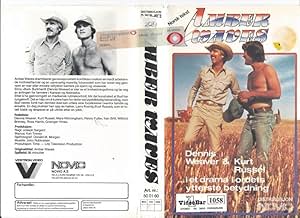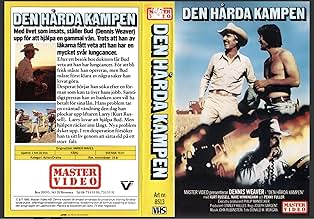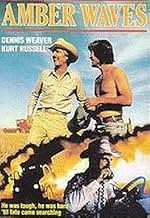A drifter stranded in Kansas accepts a job offer from a wheat harvester who, in desperation over his cancer and financial woes, attempts suicide but becomes a father-figure to the young man.A drifter stranded in Kansas accepts a job offer from a wheat harvester who, in desperation over his cancer and financial woes, attempts suicide but becomes a father-figure to the young man.A drifter stranded in Kansas accepts a job offer from a wheat harvester who, in desperation over his cancer and financial woes, attempts suicide but becomes a father-figure to the young man.
- Won 1 Primetime Emmy
- 2 wins & 7 nominations total
Rossie Harris
- Dougie Burkhardt
- (as Ross Harris)
Eloy Casados
- Dwight Willits
- (as Eloy Phil Casados)
Michael Talbott
- Tork Torkelson
- (as Michael Talbot)
Robert Weaver
- Russ Hahn
- (as Robby Weaver)
- Director
- Writer
- All cast & crew
- Production, box office & more at IMDbPro
Featured reviews
10Slim-4
Despite its simple plot, this television movie can be viewed on several levels. This story of a stranded model who reluctantly takes a temporary job on a wheat harvesting crew is about the values we cherish. Kurt Russell as the model and Dennis Weaver as the cancer-stricken harvester who needs help on his crew lend real credibility to their roles. In less than two hours the script tells us the meaning of life and death and what love is and what it isn't. This film tells us about the self-renewal which can come from hard work and responsibility.
Kurt Russell plays Larry, a male model who is stranded in a small Kansas town when he screws up a photo shoot. He literally runs into Dennis Weaver, who is looking for a warm body for his harvesting crew. He isn't too particular or he wouldn't hire this man who has never done a honest days work and has the hands to show it. Despite some rough moments Russell learns the value of hard work and becomes a leader on the crew.
Several subplots are cleverly weaved into the delightful mix. Dennis Weaver finds that he has cancer and is advised by his doctor to "bail out". This is easier said than done, because he has obligations to farmers whose wheat must be cut. He reaches out to his son, who fled to Canada because of his objection to the war. It is obvious that there is still tension between the two of them and the son returns to Canada. There is a competing harvester (played by Wilford Brimley) whose son went to Viet Nam and was maimed. Mare Winningham plays Weaver's daughter, a girl who is looking for a ticket to a new life. In the end Larry offers the only hope for another harvest.
The focus of this film is the relationship between Russell and Weaver. Despite the difference in their backgrounds, they have much in common. They meet on a day which has not been kind to either of them. Russell has lost his job and Weaver has discovered his cancer. "It's been that kind of day", he tells Russell. Uneasy and volatile at first, the relationship develops into one of affection and even love.
Filmed in Canada there is much more emphasis on scenery than usual in this television movie. "Do you ever get tired of this?", Russell asks Weaver as he gazes across the wheat fields framed in the setting sun. I don't know about him, but I never did.
Kurt Russell plays Larry, a male model who is stranded in a small Kansas town when he screws up a photo shoot. He literally runs into Dennis Weaver, who is looking for a warm body for his harvesting crew. He isn't too particular or he wouldn't hire this man who has never done a honest days work and has the hands to show it. Despite some rough moments Russell learns the value of hard work and becomes a leader on the crew.
Several subplots are cleverly weaved into the delightful mix. Dennis Weaver finds that he has cancer and is advised by his doctor to "bail out". This is easier said than done, because he has obligations to farmers whose wheat must be cut. He reaches out to his son, who fled to Canada because of his objection to the war. It is obvious that there is still tension between the two of them and the son returns to Canada. There is a competing harvester (played by Wilford Brimley) whose son went to Viet Nam and was maimed. Mare Winningham plays Weaver's daughter, a girl who is looking for a ticket to a new life. In the end Larry offers the only hope for another harvest.
The focus of this film is the relationship between Russell and Weaver. Despite the difference in their backgrounds, they have much in common. They meet on a day which has not been kind to either of them. Russell has lost his job and Weaver has discovered his cancer. "It's been that kind of day", he tells Russell. Uneasy and volatile at first, the relationship develops into one of affection and even love.
Filmed in Canada there is much more emphasis on scenery than usual in this television movie. "Do you ever get tired of this?", Russell asks Weaver as he gazes across the wheat fields framed in the setting sun. I don't know about him, but I never did.
Kurt Russell is a womanizing, irresponsible male model who is both full of himself and improbably on a shoot in the wheat fields of the Midwest, while aging Dennis Weaver works nearby with the barely profitable wheat harvesting company that he owns. Each man is having the worst day of his life, as Kurt is beaten up in a bar then fired for his now un-photographable looks and he ends up headed back to NYC with no money to get there. Meanwhile, Weaver's credit is caput at his bank, he can't find a buyer for his troubled firm and his doctor has just told him he has terminal cancer. Weaver picks up a young hitch-hiker, who happens to be Russell and when Weaver drops him off in the city the cops pounce on the young man for hitch-hiking and vagrancy, which will no doubt net him a term on a chain gang.
Weaver bails out the young model and at first his motive appears to be altruism, but his agenda becomes clear when he announces he's short of labor and that he's shanghaiing Russel to be a part of his crew. A duck out of water at first, the arrogant young pretty-boy/model gradually toughens up physically and even begins to develop character, thanks to the hard work and the good example set by straight-arrow Weaver. Against all odds Russell turns into a valuable member of the crew. Enter Weaver's daughter, played by Mare Winningham, who ends up falling for Russell, who discovers a noble streak he never knew he had, as he tells Winningham to save her love for "somebody who deserves it." This is a simple, beautiful film that puts to shame the noisy, head-rattling and cartoon-ish drivel that graces our movie theaters these days. The fine script features realistic parts for Weaver, Russell, Winningham and Wilford Brimley, who deliver uniformly fine performances. After watching this you will feel you've experienced a part of America you've probably never seen and gotten to know some people who speak and act straight from the heart.
Weaver bails out the young model and at first his motive appears to be altruism, but his agenda becomes clear when he announces he's short of labor and that he's shanghaiing Russel to be a part of his crew. A duck out of water at first, the arrogant young pretty-boy/model gradually toughens up physically and even begins to develop character, thanks to the hard work and the good example set by straight-arrow Weaver. Against all odds Russell turns into a valuable member of the crew. Enter Weaver's daughter, played by Mare Winningham, who ends up falling for Russell, who discovers a noble streak he never knew he had, as he tells Winningham to save her love for "somebody who deserves it." This is a simple, beautiful film that puts to shame the noisy, head-rattling and cartoon-ish drivel that graces our movie theaters these days. The fine script features realistic parts for Weaver, Russell, Winningham and Wilford Brimley, who deliver uniformly fine performances. After watching this you will feel you've experienced a part of America you've probably never seen and gotten to know some people who speak and act straight from the heart.
Everything about this movie is "classic," as far as custom combining movies go. About the only thing wrong with it is maybe too much licentiousness. Weaver and the others do excellent acting. Custom combining is an American tradition since World War II. In the late '70s and early '80s, there were a lot of combining crews, as combines were getting bigger and more comfortable to operate, yet they weren't as modern as today's combines. And a lot of those combines were Canadian-built Massey-Ferguson 760s. This was an ABC TV movie. It was filmed in Canada, though the movie is supposed to occur in the U.S.A. Weaver's character almost kills himself and loses a combine, but the harvest must go on.
I agree with all the other reviewers in that this is quite a well made movie, however you don't have watch too closely to see that actually not a lot of wheat gets cut by these custom cutters. In scenes with the combines, they spend most of their time just driving aimlessly around an already cut field in the dark or even worse making it appear like they are cutting wheat by in fact just driving the machine through some scrub grass. Some minimal stock footage was used of combines in wheat but it amounts to seconds of the film.
Its sad that the movie could not have had the chance to get some decent shots of the machines doing the job.
This is the only major factual fault in what really is a well produced, directed and acted TV movie.
Its sad that the movie could not have had the chance to get some decent shots of the machines doing the job.
This is the only major factual fault in what really is a well produced, directed and acted TV movie.
This is an excellent television movie with much to say that was made during the peak of the made-for-TV era. It's the story of a widower (Dennis Weaver) and his kids who travel around the farm belt hiring out as professional wheat harvesters. Kurt Russell signs on reluctantly to help. Weaver's performance is one of his best and the rest of the cast shines as well. Top notch writing, directing, photography and score. I saw this film during a very dark time in my life and it inspired me to press on and make changes. I recommend it to anyone in need of inspiration. They don't make these kind of intelligent, sensitive and involving films for television often anymore. But these are exactly the kind of films we need today.
Did you know
- TriviaThe movie was developed by Leonard Hill which was by the time he was Vice President of movies at ABC, while Philip Mandelker was producer at Time-Life Television. After the instant ratings success, both Hill and Mandelker leave their positions to set up their own production company.
- ConnectionsFeatured in The 32nd Annual Primetime Emmy Awards (1980)
Details
Contribute to this page
Suggest an edit or add missing content






























